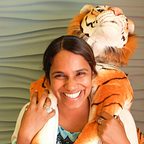A Most Essential (and Overlooked) Ingredient to Changing the World
On our respective missions to serve as a force for good in our communities, our worlds, how critical is the need to feel well and whole? Does being able to sustain ourselves personally affect our ability to get awesome sh — done? How might we as changemakers (including you!), better and more deliberately weave this into our journey?
These questions have stuck with me from Ashoka’s first-ever “Family Camp” in southwestern Wisconsin this summer. The Family Camp brought together seventeen families from twelve states, of which one of the parents is an Ashoka Fellow — a creative changemaker recognized for their community-powered work to tackle deep, systemic challenges in fields ranging from education to healthcare to agriculture to open technology. I had the privilege of being there with my own family where we spent a week together and in nature. It was a lovely week of sharing space with fantastic humans of all ages in conversation, over communal meals, engaged in family, group and individual activities and learning more about one another and the local community all at the same time.
Through the lens of my role on the project, and Ashoka’s overall efforts to support, celebrate and activate changemakers that reflect the breadth and depth of the country, many themes emerged but one stood out in particular. It’s very clear that — a sense of well-being, wellness and personal sustainability are essential in effectively taking on huge problems in society. Possessing the fierce, relentless vision to solve a critical social challenge is both incredibly powerful and demanding. This vision to make meaningful change in society is embodied by Ashoka Fellows and leading changemakers like them. Yet it is a long, arduous journey that must often coexist with other aspects of life and living such as: relationships, family, finance, health and well-being. Many threads of conversation and experience touched on this topic over the week.
Though I recognize the need to simply sit with the importance of this, the creative problem-solver in me is also spinning up open design questions such as:
How might we better integrate our roles, our “hats,” including as a changemaker?
At camp, many of us talked about how creating false divisions in our lives like personal and professional don’t make sense. Yet we still talk about wearing different “hats” that are specific to our roles as a leader of an organization, parent, partner, etc. Even a nuanced switching of hats, shifting gears, creates a degree of separation. What would integrating or consolidating those hats look like to account for different forces at play in our lives? Very practically, what for example, is the impact of our children seeing us thriving (or simply being human) as change leaders, parents and partners in one unified view?
Can we think about time and being present differently?
The notion of being over-scheduled, not having enough hours in the day is not a new one. Time poverty is talked about more these days, but the practical challenge of being present in multiple spaces at the same time is real. I wish we had some more tangible solutions in this area. But from Family Camp, I think some creative answers may live in honoring time to just be and utilizing our respective villages. At camp, we saw many folks and families give themselves permission to do whatever they needed in the moment. That could look like solo time, quality time with partners, time to miss a planned activity or even drive around the countryside as a sleepy little one gets a nap in. There was also a beautiful communal element where everyone played a part in nurturing that time. Even though it was a first meeting for many of us and we didn’t know each other all that well, there were: children and adults supporting one another, tending to little ones while the parent finished a conversation, cooking and sharing meals together. Time looks different with more permission, acceptance and community.
How can organizations and community support all changemakers in making their self-care and wellbeing a priority?
This is definitely something I think deeply about for myself and the organizations and individuals I support through my work. Programming like Family Camp for Ashoka Fellows and their families is a promising experiment. I’ve heard organizations like Echoing Green have been at the forefront of supporting the changemakers they work with. AND still, there’s more we can all do for ourselves and others. Are there leadership, funding and business models that can hold more space to help ninjas in service to something greater, stay whole, nourished and even more powerful in their work? What would it look like to learn from and co-create what this might look like with young people and other parts of our individual ecosystems that are attune and integral to how we show up each day?
As we continue to reflect on these topics, we might also think about the little and not so little things we can do each day, right now, to make sustaining ourselves a priority. Afterall, change begins here
